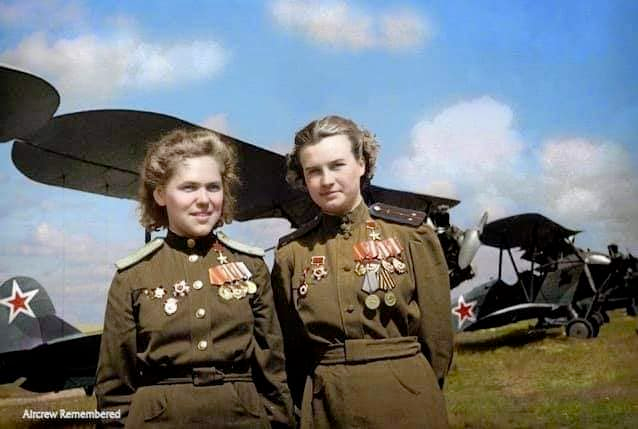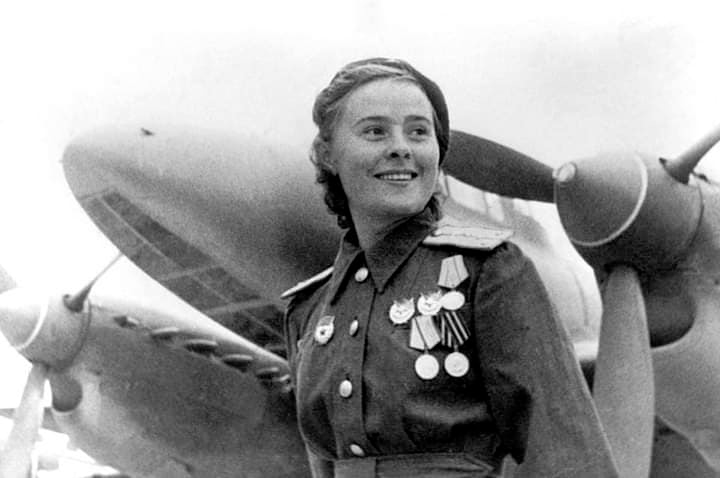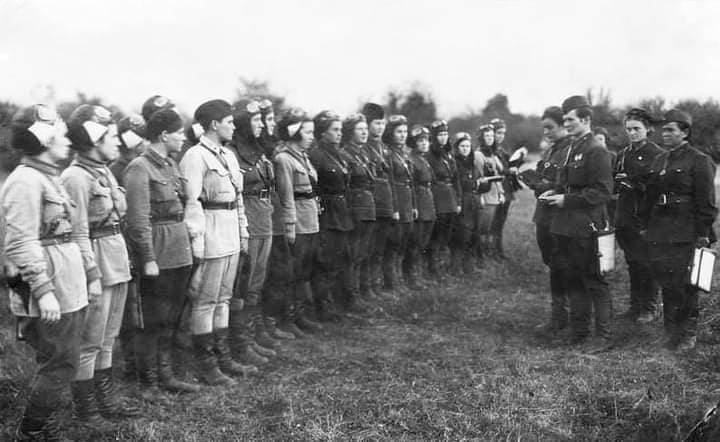Night witch Nadishda Popova
"The Nazis called them 'Night Witches' because the damage done by their plywood and canvas planes reminded the Germans of the sound of a witch's broom. Over four years, they dropped 23,000 tons of bombs on the German invaders, eventually helping to drive them back to Berlin. Any German pilot who broke this spell was awarded an Iron Cross. These young heroines, all volunteers and most of them in their teens and early 20s, have become legends of World War II but are now largely forgotten. Forgotten. Flying only in the dark, they had no parachutes, guns, radios or radars..only maps and compasses. If hit by tracer bullets, their planes would burn like sheets of paper..

Pictured here is a NY Times tribute to one of the most popular "night witches," Nadezhda Popova. Popova, who flew 852 missions during the war, passed away in 2013.
Nadesda Popova: Commander
The night witch
The life of Nadesda Popova
Two days after Christmas in 1921, a little girl named Nadishda Vasiliyevna Popova was born in Ukraine. She was a lively child, a perpetual motion machine, born with a burning desire for thrills and excitement. When she was 15, she found that excitement by joining one of the many flying clubs in the Soviet Union. She trained as a pilot and later started working as a flight instructor. She was ready to sail through the peaceful skies for the rest of her life. Then, just months before her 18th birthday, World War II began.
Nadishda thought she might join the war effort as a pilot, but she was barred from enlisting. Within the Soviet Union—and in a number of countries involved in both sides of the war—there was a feeling that sending women to the front line before death was morally or at least aesthetically distasteful. The place for war women was at home: working in factories, rationing sugar
In June 1941, when the Nazis invaded the Soviet Union, taking over her parents' home and turning it into a Gestapo police station, Nadezhda was overcome with anger, pain and a burning sense of patriotism. The worst was killing her brother. For the rest of her life, Nadezhda would remember German pilots screaming in the streets of her village, shooting down women and children as they tried to leave their homes. "Seeing this made me want to fight them," she later recalled.
For girls like her, war used to be political. Now it was personal.
But thanks to girls like Nadezhda, Russia quickly changed its stance on what was impossible to fight for, as all women needed more bodies to change their country. By October 1941, Stalin had established three female pilot regiments, one of which was called the 588th Night Bomber Regiment. 19-year-old Nadishda was thrilled when she entered the 588th, and was immediately thrust into a rigorous training program where she was expected to learn in a few months what it took male pilots years to absorb. When she and her fellow pilots don't learn to navigate the skies, they face suspicion or outright sexual harassment from male pilots, and all of these young women feel angry and threatened about suddenly participating in their world.
Soon, it's time for her first mission. She came out for the night in a cheap little plane that was given to all the pilots. Her mission was to drop two bombs on the Nazis. One is tied under each wing of her plane. But something went wrong, and she watched in horror as two of her friends were shot out of the sky and fell to their deaths. When she returned to camp, she was immediately given another mission. Her friends had no time to mourn. There was only war. And so her new life began.
Her job was brutal. She and her fellow pilots—most of them in their teens or early 20s—flew airplanes made of paper: they were thinly constructed from old plantations, plywood, and canvas, and the cockpits were open. that women don't have to worry about anti-Nazi guns; They also had to fight hail. There was no budget for female pilots, and they wore old uniforms handed down from obnoxious male pilots and old boots that were so big on them that they had to stuff their toes with toes so they could walk.

They flew at night, two in a plane, and their equipment was minimal: a map and a compass and their own eyes, peering sharply through the darkness. Their planes had no safe ammunition. To avoid enemy bullets, they had to pray. The whole regiment could be a joke - young girls with rosy cheeks, flying through the sky in airplanes. But to the Nazis they are

#blurt #blurtstory #geekpranee #ancient #flown #srilanka #war #plane